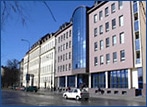About the department
History of the department
The Department of Civic Education of the Faculty of Education, Masaryk University was established in 1990, at first as the Department of Philosophy and Civic Education, and since 2000 as the Department of Civic Education. In 1999 a Centre of European Studies was founded in affiliation with the department.
The Department of Civic Education continues the traditions that go back to 1946, i.e. the year when an autonomous Faculty of Education was established, with an institute of philosophy as an integral part. This institute was founded and led for two years by one of the most important European philosophers of the 20th century, Jan Patočka.
The mission of the department is preparation of:
- teachers for Civic Education at lower secondary schools,
- teachers at upper secondary schools for the Basics of Social Sciences at secondary schools.
Web: Department of Civics 
Study
Because the aim of the department is the training of teachers for degrees in Civic Education at Lower Secondary Schools and secondary school teachers for the Basics of Social Sciences at Upper Secondary Schools, the degree comprises a whole spectrum of social science: in the sphere of philosophy it includes several semesters of instruction in the history of philosophy, ethics, ontology, biotics, philosophical antropology and human ecology. In the sphere of political science students study the history of political theories, the theory of the state and various issues concerning the processes of European integration.In further studies, they encounter courses in economics, sociology, and courses related to the history of art, cultural anthropology, but also a geographic perspective on globalization processes and education in media.
The listed courses are supplemented with a wide range of optional seminars. These look at an overview of specific problems within the basic disciplines. All the stated disciplines are complemented by a didactic approach, which is a part of these disciplines, but mainly the core of an autonomous subject, that of didactics. This subject is the focus of study from the 1st year of the follow-up Masters programme.
Knowledge, skills and attitudes acquired in the course of their studies, i.e. gradually in the three-year Bachelors and subsequently in the two-year Masters levels, form the basis of competencies for the profession of a Civics teacher at a lower secondary school.
If students study the Basics of Social Sciences, they are qualified for the profession of a secondary school teacher of the Basics of Social Sciences. However, the listed competencies also qualify them fully for the job of an instructor in leisure centres. Moreover, special knowledge acquired during their studies qualifies graduates for work in public administration, particularly in the section which concentrates on cooperation with institutions and bodies of the European Union.


